

"Out Of The Blue" AAA State of Play Blog: The ABCs of Why Play Matters! Photo by woodleywonderworks (Flickr) Play offers far more than just fun and games.
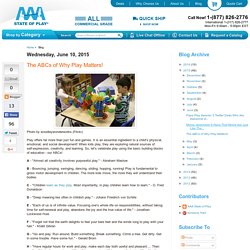
Exercise can take 10 years off your brain's age, new study shows. There's more evidence that what's good for your heart is good for your head.

A new study shows that people who run, swim or do other moderate exercise have brains that look, on average, 10 years younger than the brains of couch potatoes. "Our study showed that for older people, getting regular exercise may be protective, helping them keep their cognitive abilities longer," said Dr. What schools and parents must do to get children outside. Forbes Welcome.
Thanks for coming to Forbes.

Please turn off your ad blocker in order to continue. To thank you for doing so, we’re happy to present you with an ad-light experience. Hi again. Nixing Recess: The Silly, Alarmingly Popular Way to Punish Kids - Sigrid Anderson Cordell. When Kathy Lauer-Williams’s son was in elementary school in Allentown, Pennsylvania, he would often lose recess as a punishment for forgetting his homework or a signature on a form.

Troubled by the teacher’s habit of taking away recess, Lauer-Williams wrote about it on her blog and spoke to other parents. She found that she was not the only parent questioning this practice. Despite her attempts to talk to the school, she says nothing has changed. Taking away recess has become a common practice among teachers trying to rein in unruly students. A study by the Robert Wood Johnson Foundation found that 77 percent of school principals reported taking away recess as a punishment, while a 2006 study found 81.5 percent of schools allowed students to be excluded from recess. Cutting Physical Education and Recess: Troubling Trends and How You Can Help.
By Erica Lue, Advocacy Coordinator, National PTA Since the 2001 passage of the No Child Left Behind Act, many schools have struggled to find ways to meet the act's rigorous assessment standards.
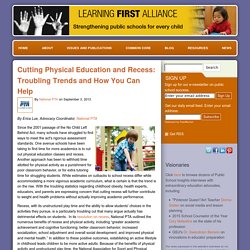
One avenue schools have been taking to find time for more academics is to cut out physical education classes and recess. Even as Obesity Concerns Rise, Physical Education Is Sidelined. Physical education in school. “Eighty per cent of schools provide intramural and interscholastic opportunities for physical activity, but just over half support transportation to support these activities, which may limit participation options for some students.

In addition, one-third of schools reported that at least half of the student body participates in activities before and after school, yet only 10 per cent of schools arrange late busing so students can participate in after-school activities, which again limits opportunities for participation” (Active Health Kids Canada, 2007, p.18)“According to the 2005 Survey of Canadian Schools, almost all elementary and middle school students in Canada take at least one physical education class per week: The average is three days of physical education classes per week” (Active Health Kids Canada, 2007, p.18). Sitting Is the New Smoking: Ways a Sedentary Lifestyle Is Killing You. The ticking clock and furious patter of computer keys are staples in offices around the world.

Regardless of specific business, offices share many similarities. One such similarity is a sedentary culture and studies show all that sitting is taking a major toll on employee health. Welcome. The cognitive benefits of play: Effects on the learning brain. © 2008 - 2014, Gwen Dewar, Ph.D., all rights reserved Science supports many of our intuitions about the benefits of play.
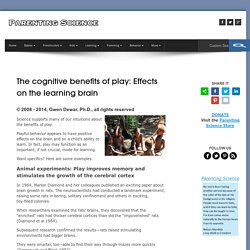
Playful behavior appears to have positive effects on the brain and on a child’s ability to learn. Play And How It Impacts Early Brain Development. Brain Games Are Not Just Kid's Play, Aging Experts Say. By the time Ann Stewart hit retirement age, the real estate executive was starting to notice some "senior moments.
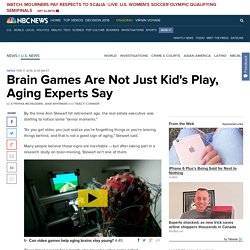
" "As you get older, you just realize you're forgetting things or you're leaving things behind, and that is not a good sign of aging," Stewart said. Many people believe those signs are inevitable — but after taking part in a research study on brain-training, Stewart isn't one of them. Three times a week for a month, she played a video game called "NeuroRacer," guiding a car down a winding road while picking out flashing circles along the way. The game's creator, Dr. Video Games in the Brain: Study Shows How Gaming Impacts Brain Function to Inspire Healthy Behavior. “Identifying a direct connection between the stimulation of neural circuits and game play is a key step in unlocking the potential for game-based tools to inspire positive behavior and improve health,” said Brian Knutson, Ph.D., Stanford University.
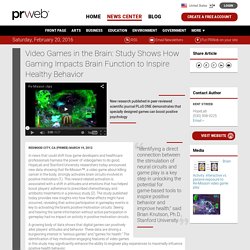
Redwood City, CA (PRWEB) March 19, 2012 In news that could shift how game developers and healthcare professionals harness the power of videogames to do good, HopeLab and Stanford University researchers today announced new data showing that Re-Mission™, a video game about killing cancer in the body, strongly activates brain circuits involved in positive motivation (1). Letting kids move in class isn’t a break from learning. It IS learning. Students in Robbi Giuliano’s fifth-grade class sit on yoga balls as they complete their assignments at Westtown-Thornbury Elementary School in West Chester, Pa. (MATT ROURKE/ASSOCIATED PRESS) Last July I published a post titled “Why so many kids can’t sit still in school today.”
It hit a nerve and became one of the most-read pieces on this blog last year, with readers continuing to click on it, along with related posts, such as “The right — and surprisingly wrong — ways to get kids to sit still in class” and “A therapist goes to middle school and tries to sit still. She can’t. Play = Learning: How Play Motivates and Enhances Children's Cognitive and ... - Dorothy G. Singer, Roberta Michnick Golinkoff, Kathy Hirsh-Pasek. The Importance of Play: Why Children Need to Play, Early Childhood Today, 2005-Sep. In this article, the authors discuss the important role of dramatic ("pretend") play in early childhood with increasing emphasis at school on developing academic skills in children at younger and younger ages. Braininmind. Learning Through Movement and Music: How Exercise Benefits the Brain. How Exercise Benefits the Brain. Earlychildhood NEWS - Article Reading Center. It appears that research is now supporting what we in early childhood education have been saying for years.
That is, positive early experiences forge the foundations for lifelong learning and behavior. ResultsSallis. ASCD Book: Teaching with the Brain in Mind, 2nd edition. Teaching with the Brain in Mind, 2nd edition Eric Jensen. Teaching with the Brain in Mind, 2nd ed., Rev. and Updated. Exercise: a behavioral intervention to enhance brain health and plasticity. Move Your Body, Grow Your Brain. Movement and Learning. 2 4 book review 5. Kindergarten report. Gestwicki85549 1111185549 02.02 chapter02.
Forbes Welcome. A School Day That’s All About Play. Memeoirs Turns WhatsApp Chats into a Book. The Value Of Hard Work. Why Playful Learning Is The Key To Prosperity. The Value Of Hard Work. Tapping Into the Potential of Games and Uninhibited Play for Learning.